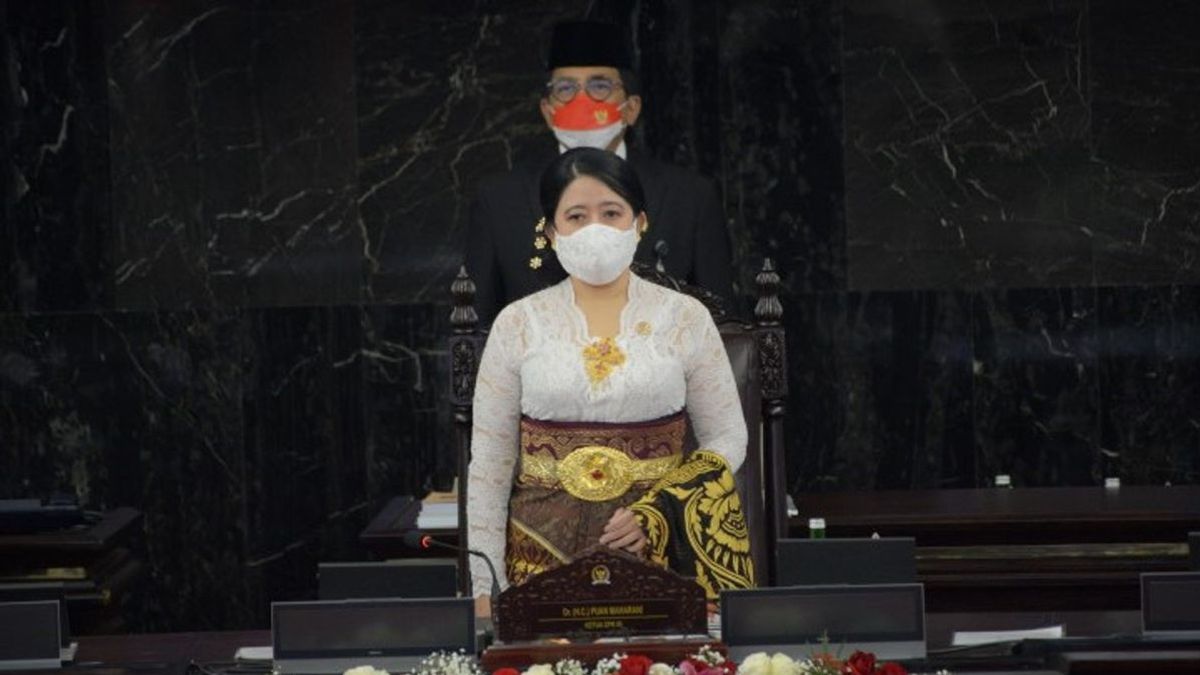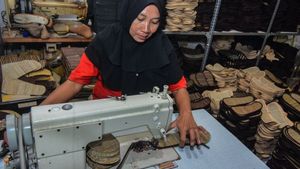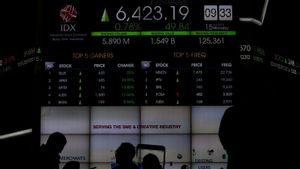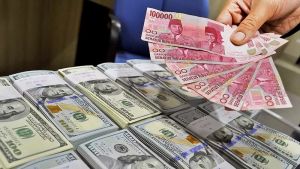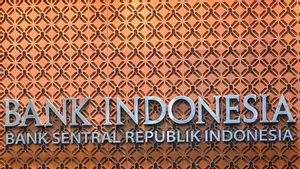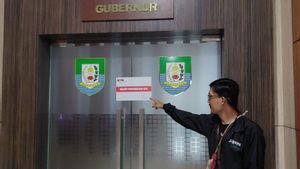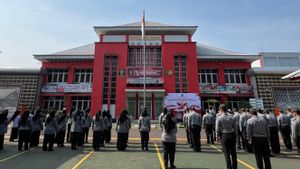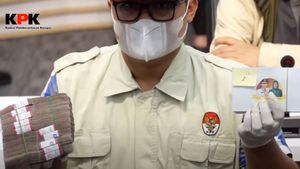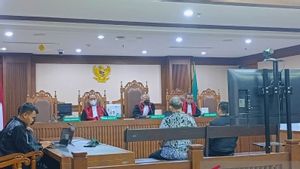JAKARTA - DPR Chair Puan Maharani received an introduction to the Bill on the State Revenue and Expenditure Budget (APBN) for Fiscal Year 2022 and its Financial Note from President Joko Widodo at the Plenary Meeting of the Opening Session of the First Session of the DPR.
Puan conveyed a number of notes to the government regarding the function of the DPR's budget which will be focused on discussing the Draft State Budget (RAPBN). Where in the previous session, the DPR together with the Government discussed the Macroeconomic Framework and the Principles of Fiscal Policy (KEM-PPKF) for 2022.
“During the discussion, the Indonesian House of Representatives and the Government realized that the 2022 RAPBN would be drawn up in the midst of a high uncertainty situation due to the COVID-19 pandemic. Therefore, various fiscal anticipations are needed in the State Budget for Fiscal Year 2022," said Puan, Monday, August 16.
Puan also mentioned about Indonesia's economic growth in 2020, which contracted to negative 2.07 percent, year on year. In addition, Indonesia's poverty rate in March 2021 again increased to double digits of 10.14 percent or an increase of 1.12 million people when compared to March 2020.
"In terms of employment, BPS recorded a spike in the unemployment rate from 4.94 percent in February 2020 or before the pandemic, to 6.26 percent in February 2021 or an increase of 1.82 million people. These figures show the extraordinary impact of this pandemic on the decline in the welfare of the people," explained Puan.
According to Puan, the decline in the welfare of the people could be much deeper if the Government did not respond quickly through extraordinary policies and countercyclical policies throughout 2020.
Puan also emphasized that the DPR supports the Government's steps to issue Government Regulation in Lieu of Law Number 1 of 2020 which was later ratified into Law Number 2 of 2020, including the COVID-19 Handling Program and National Economic Recovery (PEN) which the Government is still carrying out until now. At the moment.
"The government should continue to make various performance improvements in implementing various government policies and programs, as discussed and recommended in Commission meetings and other AKD (board equipment) with the Government," he said.
Puan reminded that the people increasingly need the presence of effective government policies and programs in providing protection in the health, social and economic fields. He explained that 2021, which is the second year of the COVID-19 pandemic, is still the main factor affecting the social and economic life of the people.
"Currently we are facing a second wave of COVID-19 pandemic attacks, which several countries have experienced before. The DPR can appreciate the Government's efforts, which have prioritized the safety of people's lives, by implementing stricter restrictions on community activities," explained Puan.
Even so, the government is asked to anticipate various consequences on the social and economic conditions behind the policies made. Puan said that in fact Indonesia's economic activity had begun to grow in the first and second quarters of 2021.
“Our economy is already on a recovery trajectory. Economic growth in the first quarter of 2021 was 0.74 percent year on year, while in the second quarter of 2021 economic growth reached 7.07 percent year on year," he said.
In Quarter III-2021, said Puan, it can be estimated that the rate of economic growth will again be depressed by the PPKM (Enforcement of Restrictions on Community Activities). The 2021 economic recovery trajectory (trajectory) is considered to be a reference in designing and preparing fiscal anticipation for the 2022 fiscal year.
"Experience in carrying out the 2021 Fiscal Year APBN, which must respond to the handling of the COVID-19 pandemic, and has resulted in the Government refocusing various programs and budgets, so that it can be anticipated in the upcoming 2022 Fiscal Year APBN," said Puan.
This is so that the Government can remain effective in carrying out other government duties, in addition to focusing on handling the COVID-19 pandemic. Puan said that there was optimism for the global economic recovery in 2022 following the IMF's projection for global economic growth of 4.9 percent, an increase of 0.5 percentage point compared to the April 2021 projection revealed in the World Economic Outlook July 2021.
"The IMF projects that this projection will of course depend on the world's ability to control the outbreak and ensure the success of vaccination in realizing community immunity globally," he said.
On the other hand, the world health organization (WHO) predicts that this pandemic will not end until next year, at least until the middle of 2022. This condition will be a challenge for Indonesia's social and economic recovery in the coming year.
"In addition, risks and uncertainties that will remain high in 2022 are also a challenge for our economy. Among them is the risk of uneven speed of recovery between countries due to differences in the COVID-19 pandemic situation, speed of vaccination, and support for economic stimulus," explained Puan.
The former Coordinating Minister for Human Development and Culture also highlighted the possibility of accelerating the normalization of monetary policy in the United States and other developed countries as an implication of their faster economic recovery. Puan assessed that this would create a spillover effect on the volatility and uncertainty of global financial markets and global capital flows.
"This includes the potential risk of the Rupiah exchange rate against the US Dollar as well as the increase in world crude oil prices in line with the global economic recovery process," he said.
Puan added, these various dynamics and challenges cannot be separated from the development of the COVID-19 pandemic which is full of uncertainty. Regarding the capacity and resilience of the 2022 state budget, he reminded to anticipate the uncertainty caused by the COVID-19 pandemic.
The capacity of the State Budget itself is largely determined by economic growth, particularly state revenues. Meanwhile, economic growth occurs when there is an increase in the production of goods and services to meet consumption demand. With the increase in production, it will also increase people's income.
“How can the production of goods and services take place in the midst of the COVID-19 pandemic situation? This is a challenge that we must face together. Therefore, fiscal policy in 2022 is directed to prioritize handling the health sector as the key to successful economic recovery, strengthening and maintaining people's purchasing power, as well as the recovery of MSMEs and the business world," said Puan.
The grandson of the Proclaimer and the first President of the Republic of Indonesia, Sukarno, also warned the government regarding the preparation of the RAPBN. Puan hopes that the government will make various efforts in the midst of the state budget, which has decreased state revenues, increased spending for handling the pandemic, and widening deficit financing.
"So the government should be able to optimize state revenues, innovate financing, and rationalize state spending that meets spending quality better. In the field of taxation, the Government should be able to carry out the provision of more targeted and measurable fiscal incentives for strategic economic activities that have a strong multiplier effect," he said.
The government is also asked to expand the tax base through the expansion of tax objects and regional-based extensification as well as to strengthen a healthier and fairer taxation system that is adapted to the development of the economic structure and character of the business sector. Then, the government is expected to explore tax potential while maintaining the investment climate and the sustainability of the business world.
“One of the efforts in optimizing tax revenue is taxes on digital-based economic activities. As is known, during this pandemic when various economic sectors experienced a decline, the digital economy actually grew rapidly. In addition, digital transformation is also increasingly widespread in various fields such as finance, education, health services, and so on," said Puan.
On Non-Tax State Revenue or PNBP, the government is reminded to optimize the management of natural resources while still paying attention to environmental sustainability. In addition, optimizing asset management to be more productive, increasing innovation and service quality of work units and public service agencies, optimizing state dividend receipts, improving policies and exploring potential, as well as expanding the use of information technology.
"In managing the Deficit Financing, the Government must be very careful in maintaining the debt ratio within safe limits and in accordance with the law, increasing the efficiency of debt costs, as well as maintaining an optimal composition of the debt portfolio in maintaining economic stability and paying attention to the fiscal capacity of the APBN for the future. come," he said.
Puan said, Rationalization of State Expenditures that have better spending quality is characterized by efficient, productive spending, producing an economic multiplier effect, and being effective in improving people's welfare. For this reason, the government is asked to carry out the spending quality policy consistently and with discipline for all Ministries and Institutions.
"The government must also be consistent in maintaining the Central Government's spending policies in Ministries directed at HR Reform, Bureaucratic Reform, Efficiency, Basic Service Infrastructure, Targeted Subsidies, Support for Regional Infrastructure Development, and disaster anticipation/mitigation," said Puan.
The DPR also reminded Ministries/Agencies to be disciplined in program and budget allocations directed at the policies mentioned above. The policy in question, according to Puan, has become a Government Commitment that was conveyed during the KEM PPKF.
"The 2022 State Budget Bill and its Financial Note submitted by the President of the Republic of Indonesia are expected to be able to meet the expectations of the Indonesian people in dealing with the COVID-19 pandemic and its impacts, restoring the national economy and carrying out structural reforms in the administration of government," he said.
The English, Chinese, Japanese, Arabic, and French versions are automatically generated by the AI. So there may still be inaccuracies in translating, please always see Indonesian as our main language. (system supported by DigitalSiber.id)
